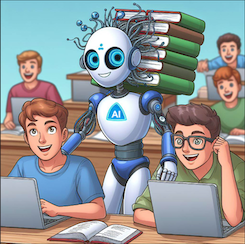Getting ready for finals? ChatGPT can help with that!
March 20, 2024 / Digital Learning / Tags: AI, Finals

Getting ready for finals? ChatGPT can help with that!
It is about that time in the semester when everyone starts to think about finals (and summer!). Students can feel overwhelmed by the amount of work they need to do to prepare for either a final exam or final paper/project. Turning to a Large Language Module (LLM) like ChatGPT can help students to manage the workload and be more successful in the end. Below are a few ways that students can use ChapGPT (or any LLM) to study for a final exam or complete a final paper.
Studying for Exams:
Flashcard Creation: Students can use ChatGPT to generate flashcards based on their study material. They can input key concepts, questions, or terms, and ChatGPT can provide concise definitions or explanations, helping students reinforce their understanding.
Practice Quizzes: ChatGPT can generate practice questions similar to what might appear on exams. Students can test their knowledge and understanding by answering these questions and receive immediate feedback from ChatGPT.
Concept Clarification: If students are struggling to understand certain concepts or topics, they can ask ChatGPT for explanations in simpler terms. ChatGPT can provide additional examples or analogies to aid comprehension.
Study Schedule Planning: ChatGPT can assist students in creating personalized study schedules based on their course syllabi and exam dates. It can suggest effective study strategies and allocate time for reviewing different subjects.
Essay Outlining: For subjects that require essay-style answers, students can use ChatGPT to outline their essays. By providing key points or arguments, ChatGPT can help structure the essay logically, ensuring that all important aspects are covered.
Completing Written Papers:
Research Assistance: ChatGPT can help students find relevant sources and articles for their papers by providing search queries or summarizing existing research. It can also suggest keywords to use when searching for academic literature.
Draft Revision: After drafting their papers, students can use ChatGPT to receive feedback on their writing style, grammar, and clarity. ChatGPT can offer suggestions for improvement and help identify areas that need further development.
Brainstorming Ideas: If students are stuck on choosing a topic or developing their thesis statement, ChatGPT can brainstorm ideas based on their interests and course requirements. It can suggest potential angles or perspectives to explore.
Citation Formatting: ChatGPT can assist students in correctly formatting citations and references according to different citation styles (e.g., APA, MLA). Students can input their sources, and ChatGPT can generate properly formatted citations for them.
Plagiarism Checking: Before submitting their papers, students can use ChatGPT to check for unintentional plagiarism. ChatGPT can compare their text with online sources and flag any similarities, helping students ensure academic integrity.
By utilizing ChatGPT in these ways, college students can enhance their study sessions, improve their writing process, and ultimately excel in their exams and written assignments.
Additional Resources:
Using Generative AI to Boost Student Studying (Capitol Technology University)
Generative AI as a Study Tool (La Trobe University)
Using AI ethically in writing assignments (University of Kansas)
Share Post
